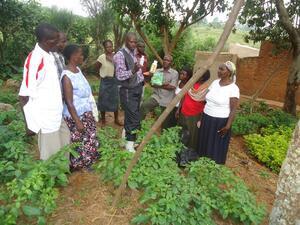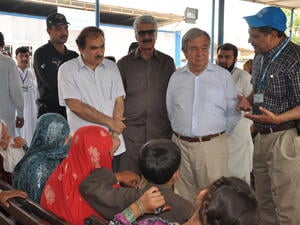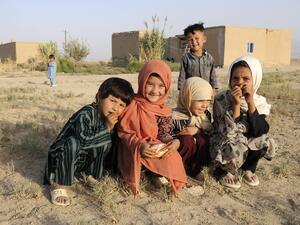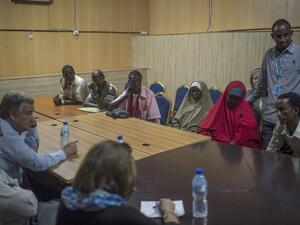UNHCR chief commends Pretoria's refugee policy, pledges cooperation
UNHCR chief commends Pretoria's refugee policy, pledges cooperation

High Commissioner António Guterres listens to refugees with Minister of Home Affairs Nosiviwe Mapisa-Nqakula to his left.
JOHANNESBURG, South Africa, August 24 (UNHCR) - UN High Commissioner for Refugees António Guterres on Friday paid tribute to the South African government for its progressive policy on refugees and asylum seekers, including a commitment to ease access to basic services.
"If you look at the policy and legal statutes of South Africa, refugees enjoy one of the most advanced and progressive systems of protection in the world today," he said at a meeting here co-hosted by Minister of Home Affairs Nosiviwe Mapisa-Nqakula.
Guterres told refugees attending the meeting that there was no denying the South African government's commitment to opening up services such as health and education to them, but he said that the authorities faced challenges in implementation of this policy.
The refugees told the High Commissioner that they were concerned about obstacles to their integration in society, despite documentation that entitles them to virtually all the rights of citizens in the country - including the right to work and access to primary education and basic health services. They claim employers and civil servants frequently ignore their papers.
Mapisa-Nqakula said she recognized the difficulties they faced and she pledged to redouble efforts by her ministry to fully implement policies aimed at integrating refugees and asylum seekers into society.
"I am humbled by Minister Mapisa-Nqakula's recognition of the existing problems, because the responsibility of a government is not to protect itself but to acknowledge its problems and commit to work for change," Guterres said.
"UNHCR is working with a government that recognizes its challenges and is determined to work on rectifying them. Our role in South Africa is to try to help the government in order to facilitate the improvement of protection and assistance given to refugees," he added.
The High Commissioner's visit to South Africa comes at a critical period for the Ministry of Home Affairs as it strives to cope with an inflow of migrants and refugees.
"A decade ago, South Africa was a refugee-producing country," said Mapisa-Nqakula. "Today, we are a refugee-receiving country that has to deal with the challenges of a mixed migration flow. This has seen our refugee system clogged up by those migrants who are in the country for economic reasons but try to regularize their stay by claiming asylum."
With UNHCR help, Mapisa-Nqakula's ministry launched a major effort last year to clear the backlog of asylum applications - some going back several years. South Africa received 53,000 asylum applications last year - more than any other country in the world.
"Managing the phenomenon of mixed migration - which also means ensuring that refugees receive protection - is not only a matter of legal obligation and a moral imperative, but is [also] an enormous administrative challenge," said Guterres.
UNHCR has made the strengthening of national capacities to identify refugees and deliver protection a major strategic objective globally.
In addressing the country's many challenges, the Home Affairs Ministry has agreed to strengthen cooperation with UNHCR in addressing matters affecting asylum seekers and refugees. "We express our appreciation to UNHCR for the assistance and support they have given the South African government in discharging our obligations to refugees," said Mapisa-Nqakula.
During his visit, the High Commissioner also met President Thabo Mbeki and other senior officials for talks on the humanitarian and protection needs of refugees. Guterres also toured offices in Cape Town and Johannesburg that deal with the backlog of asylum applications.
Guterres was due to fly back to Europe late Friday after a trip to southern Africa that also took him to Zambia and Mozambique.
By Pumla Rulashe in Johannesburg, South Africa







